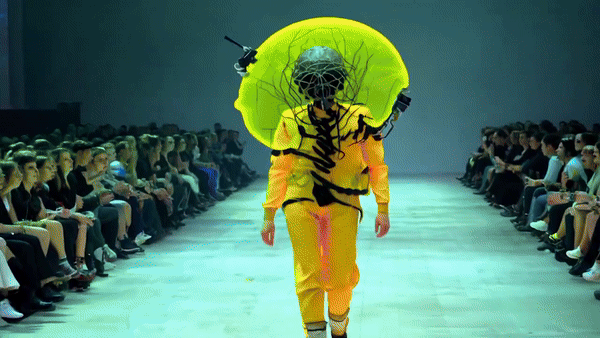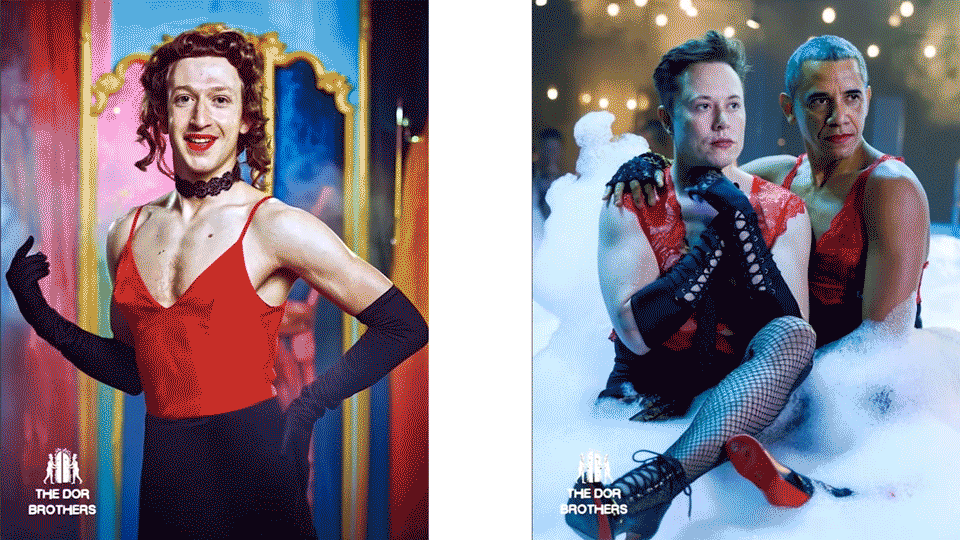
Having survived a ban on Facebook for some of their content, and with the election how history, we can finish what was started with Yonatan of The Dor Brothers, makers of hyper-realistic, AI viral videos. You can see more in the first part of this story in which Yontan unashemedly says, "Anyone who's complaining about AI now will use it later".
Anarchic recent viral videos depicted public figures such as Donald Trump, Joe Biden, Kamala Harris and Elon Musk toting guns or cross-dressing in lingerie, but they seemed to have stopped – on X at least.
I spoke to Yonatan over Zoom before the recent US election. He says he works 12 hours a day. Does he ever take a day off?
"I mean, define 'day off'!" he smiles. "I travel a lot, but I travel while I work. I fly to different countries, I’m [working] most of the time but then I go out and check out the cities."
I ask if he brainstorms the videos beforehand with a storyboard, or if he just sits down at his computer and sees where his imagination takes him. "I have a lot of people on my team and I allow them to have creative freedom and come up with things," he says.
"With those really viral videos, I come up with a concept and start playing with it. One of the main things to know when you’re making AI videos is not to come prepared with 'I'm gonna do this and this is exactly what it's gonna be'. You need to make stuff, and depending on how good the results are, you go down that path."
For instance, he explains, "I wanted idea A, but then I generated something that could be a totally different thing, so I'll go that way instead."
Does he ever scrap stuff and think a certain direction isn't working? "Usually we try our best to make something happen, but if we feel like it’s not gonna happen, we scrap it, yeah."
I ask if he thinks AI art is at its best as a means of responding to the news in the moment – because he can create an AI video in a day, whereas TV series and feature films could take years.
"I think quickness is an element, for sure," Yonatan replies, "and maybe it's more affordable and better quality at certain levels, depending on budget. But I think eventually what we’re talking about here is [reaching the stage of advanced technology of] your brain emitting images directly from your thoughts into a canvas, and it’s going to be the exact thoughts you’re having, visualized to the outside world.
"I don't think there's a higher quality possible than your pure thoughts. Eventually that’s where it’s heading. So people can keep arguing about cameras and actors and writers, but we’re talking about a totally different kind of species and a way to interact with each other technologically – it's not about art, specifically."
But nearly all people have unacceptable thoughts that they'd never want made public, I point out. "Everybody, in my opinion," he agrees.

So you'd have to select the thoughts very very carefully, wouldn't you? You'd need a careful editing process going on in your brain. But I'm imagining he's talking about decades down the line, right?
"It seems a bit sci-fi right now," Yonatan concurs. "That's why I think regulating in a wise way is smart right now. You don't want to just say, 'AI's too powerful, shut down everything', because in the end you're gonna have one entity which controls your thoughts without you [having the option to stop it]. In my opinion it should be a tool, like a choice of activating my brain transmission right now. But it's a big question."
Can he ever imagine AI becoming genuinely creative in itself without human input?
"There's something I say a lot, and I think this is the point for me right now: AI is a different species of life to humans and animals. I think it would be able to make creative decisions, but that AI understands. Because when you make a joke, a dog doesn't understand the joke.
"And maybe AI will make jokes, and understand each other, but we won't get the humor. Humans connect to human art – you watch a movie because the actor is somebody you know, and the script was written by somebody with real-life experience who went through something. Even though AI could create and try to replicate that, I think there would be a gap between what it creates and what we relate to."
He posts his AI videos responsibly, with disclaimers, I say. But is there a danger of somebody less responsible creating plausible AI of public figures committing atrocities, posting them on social media and thereby inciting riots, I ask?
The Hustle - Part 2 🔫🔥Experimenting with uncensored AI generators like @grok and Flux to create some unhinged, satirical content 🙌💯 @elonmuskSong: Hanumankind - DamnsonPlease Note: We don't take political stances or aim to spread fake news or fear. While we believe the… pic.twitter.com/SEoHXiAdo1August 28, 2024
"Of course I believe it, and that's why we're making those satirical videos," he says seriously. "The fact we're going viral allows people to adjust to the fact that it's already possible to make those things. And instead of scaring them, we're making them laugh and think. Somebody said that 'comedy is the frontier of development' – because comedians say whatever they want and they make people think about darker subjects.
"So we're making funny videos to make people think about darker subjects. And they [the people making plausible videos] have to be as good as us, which is not easy right now, so good luck."
His are the most realistic I've ever seen – and I've seen so many people say that they're scary, because they initially thought they were real. But AI art isn't widely accepted yet. What will it take for it to become more legitimate?
"I don’t want to sound arrogant, but it's just obvious to me," Yonatan says. "Anybody who's complaining about it now will use it later. Whatever they're saying right now and however they're kicking and screaming and shouting, they can keep going but they will switch sides. Because those same people, I don't see them on a horse going to work, and I don't see them in an Amish village plowing fields, you know what I mean? The same thing will happen here.
"Right now they’re angry, but in the end they will rationalize their own use of it in some way or another. It's inevitable."
They're scared that it's going to replace them, I say. As a writer of novels myself, I tell him that a lot of writers are terrified – and publishers are making us sign contracts confirming that no AI was employed in the writing of our books and articles.
However, The Dor Brothers are doing something at the other end of the scale – Yonatan's right at the forefront of using it to make art. Could it be that those writers and artists complaining about AI and refusing to use it will be left behind?
"Somebody said it before me: the only thing we have to fear is fear itself, and the people who prevent themselves from testing things out and experimenting and are immediately shutting it down… Most people don't even understand it. When we make an AI video, we always write at the end, 'Directed by The Dor Brothers', and people say, 'Directed by? What a stupid thing.'
"It's not like we push a button and go, 'AI, do my homework, I'm gonna go to the beach', you know what I mean? It's just a tool, like anything else. Use Photoshop and you're 'cheating' too, I guess. Using a computer? A caveman would be ashamed of you! You hunt with a rifle, not with a bow?
"This is the nature of humanity and change, I think it’s overly dramatized right now," he concludes.
It’s clear that so much work goes into his videos, I say, because they're so clever and so imaginative. In terms of equipment, what does he use?
"A medium-level laptop while I'm traveling, that's all," he says. "There's no level of entry, I think anyone could do it if they tried and wanted to. There's no need for expensive stuff."
But not at his level, surely? "I spend a lot of money and I use a lot of tools because I use them without fear and I use them a lot. But I think the average person who wants to try it doesn't need to generate eight thousand images per day."
In terms of developing his craft, how does he stay on top of AI trends and video editing trends? Does he read a lot, does he watch a lot of other videos to keep on top of what other people are doing?
"Well, I'd say humbly that we create the trends and make other people copy us. We're at the stage where we create art and other people enjoy it. We're not here to please other people with creation – we're here to please ourselves, creating something we enjoy.
"When I hire new people to work on these videos, the point is not that we assign roles and you have to do this part and this part. The point is that you enjoy the creative process, and wherever it leads is the right place. There are no subordinates and people fulfilling orders, we're just making stuff we enjoy – and that's why people enjoy it when they watch it as well."
He's currently working on an AI video production course. "So it's a waiting list right now as it's not complete, as we're too busy creating things, and we don't want to make a half-assed course that people don't really learn from." When he launches it, he says, it’s going to be "probably the best one available".
At the end of many of the videos, Yonatan appears with his identical 'twin brother'. I suggest that his twin is an AI animation, and that there are no Dor Brothers as such. "It's a mystery, I can't reveal," he says, smiling.
People can follow his creations on Twitter / X, Facebook, Instagram and YouTube, or invest in The Dor Brothers services at their site.
Find out the best AI image generation tools and how to introduce AI image generation into your photography workflow.







